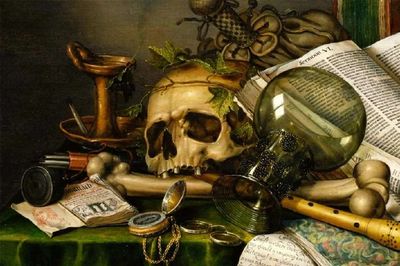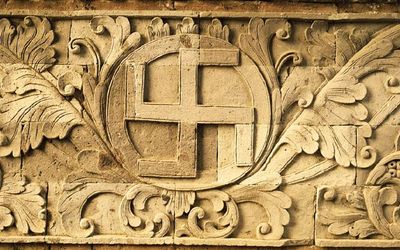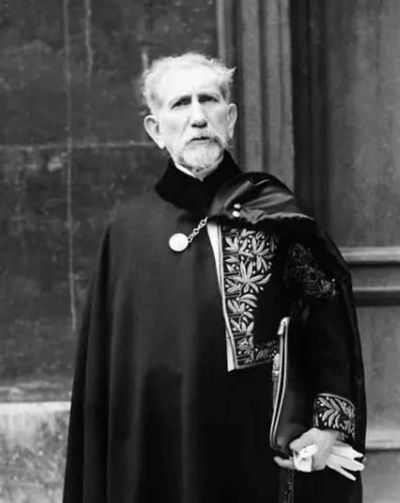
Ghost of de Maistre
"Ghost of de Maistre" 群组最新帖子
19.05.202502:03
To let all of you know, Gornahoor is back and running again with the friends of Salvo and other contributors doing their best to keep it going and to bring new material to those interested in such matters. Here is the first of the new articles on the site and from Tannheuser, in which he lays out the future plans for the site:
https://gornahoor.net/?p=17372
https://gornahoor.net/?p=17372
28.03.202501:41
“As Meister Eckhart has shown, that which emerges into time as if from it is already outdated and has fallen to death; however, that which is in time but not from it is incomprehensible to time and thus not consumable by it.”
― Franz von Baader


16.11.202411:31
One of the most striking forms of the "horizontal" cross, that is, the cross traced in the plane which represents a certain degree of existence, is the figure of the swastika, which indeed seems to be directly attached to the primordial Tradition, for it is found in the most diverse and widely separated countries, and from the most remote periods. Far from being an exclusively Eastern symbol as is sometimes thought, it is one of those most generally distributed, from the Far East to the Far West, for it exists even among certain indigenous peoples of America. It is true that at the present day it has been preserved more especially in India and central and eastern Asia... yet even in Europe it has not wholly disappeared. In antiquity this sign occurs among the Celts and in pre-Hellenic Greece ; again. in the West, it was anciently one of the emblems of Christ, and it even remained in use as such down to nearly the end of the Middle Ages.
— The Symbolism of the Cross, by Rene Guenon


16.11.202411:01
Whatever is acquired by single combat is acquired with Right. For when human judgment fails, either because it is wrapped in the darkness of ignorance or because it has not the aid of a judge, then, lest judgment should remain forsaken, recourse must be had to Him who so loved her that, by the shedding of His own blood, He met her full demands in death. Hence the Psalm: “The righteous Lord loveth righteousness.” This end is accomplished when, with the free consent of the participants, in love and not in hatred of justice, the judgment of God is sought through a mutual trial of bodily and spiritual strength. Because it was first used in single combat of man to man, this trial of strength we call the duel.
— De Monarchia, by Dante Alighieri
无法访问
媒体内容
媒体内容
15.11.202411:30
All my favorite ideas—order, tradition, discipline, hierarchy, authority, continuity, unity, work, family, corporation, decentralization, autonomy, organization of workers—had been preserved and perfected by Catholicism. As Catholicism of the Middle Ages wallowed in the philosophy of Aristotle, our social naturalism took Catholicism as one of its most solid and the dearest points of support.
— Religious Democracy, by Charles Maurras


15.11.202411:02
The court of Charlemagne is the Olympus of Jupiter of the age of chivalry. The sagas of the twelve Paladins are and were known everywhere and belong collectively to all more cultivated nations, the Spaniards, Italians, French, Germans, English.
— The Philosophy of Art, by Friedrich Schelling
无法访问
媒体内容
媒体内容
14.11.202411:31
The West no longer knows Wisdom: it no longer knows the majestic silence of those who have mastered themselves, the bright calm of the Seers, the superb “solar” reality of those in whom the idea has made itself blood, life, and power. Wisdom has been supplanted by the rhetoric of “philosophy” and “culture”, the realm of professors, journalists, and sportsmen—the plan, the program, the proclamation. It has succumbed to sentimental, religious, humanitarian contamination, and the race of chatterers who run around madly exalting “becoming” and “practice”, because silence and contemplation frighten them.
— Pagan Imperialism, by Julius Evola
无法访问
媒体内容
媒体内容
14.11.202411:01
In Catholic countries the monks carry on the struggle against the prince of evil who triumphs in this world, and would subdue them to his will; in Protestant countries small fanatical sects take the place of the monasteries. These are the battle-fields which enable Christian morality to hold its own, with that character of sublimity which to-day still fascinates many minds and gives it sufficient lustre to beget in the community a few pale imitations... Catholic saints do not struggle against abstractions but often against apparitions which present themselves with all the signs of reality.
— Reflections on Violence, by Georges Sorel
无法访问
媒体内容
媒体内容
13.11.202411:31
The concept of Victory is of the utmost importance in the traditional theory of Kingship. Exoterically it is by an actual or implied victory over others that a King obtains the throne, but esoterically he is the true Victor who subdues his own passions, allying himself with the Self against himself. The heroism expected of the Knight, whether as King or as the Mortal Soul and Outer Man, is then no longer a matter of merely physical courage, but a symbol and evidence of self-conquest and self-knowledge; autonomy, as we have seen, being the outward tally of an inward Self-control. Whoever has thus found Himself is necessarily both fearless and invulnerable.
— Spiritual Authority and Temporal Power in the Indian Theory of Government, by Ananda Coomaraswamy
无法访问
媒体内容
媒体内容
12.11.202411:31
It is natural to believe in great men. If the companions of our childhood should turn out to be heroes, and their condition regal, it would not surprise us. All mythology opens with demigods, and the circumstance is high and poetic ; that is, their genius is paramount. In the legends of the Gautama, the first men ate the earth, and found it deliciously sweet.
— Ralph Waldo Emerson, "Representative Men", Lecture I
无法访问
媒体内容
媒体内容
12.11.202411:01
No doubt, Jünger ought to have chosen a better term, for his 'worker' does not describe a social class - the working class - nor does it have anything to do with the Leftist idea of the industrial proletariat. Rather, Jünger's term 'worker' refers to a broad human type which shares certain traits with both the ascetic and the warrior, and affirms its way of being with detachment and clarity in all aspects of life. Jünger describes the present age as an age of transition, and outlines various prospects for the future role of the 'worker', not least in the realm of politics. Jünger here defends the ideal of hierarchy and talks in terms of a new Order. As this Order is described by Jünger as being both 'Spartan' and Prussian, it is clear that what the author has in mind are the values that have surfaced in the past, and are surfacing today among movements which are situated on the opposite side of the political spectrum, yet share a rejection of bourgeois and liberal values.
— On Ernst Jünger, by Julius Evola
无法访问
媒体内容
媒体内容
11.11.202411:30
First as a thinker and as a man with a richly developed imagination, the poet is almost always a prophet as well, ‘the mirror of the gigantic shadows which futurity casts upon the present . Dante is a signa instance of this. He foreshadowed the liberation of the mind which was then about to begin. But in one respect I differ from you; a poet is not the herald of a specific revolution. The course to be taken by a revolution cannot be accurately predicted; its outlines are continually reshaping themselves. Thinkers and poets are like stormy petrels; they feel that a storm is brewing, but do not know from what quarter the wild will blow, or what changes it will induce...
— Talks with Mussolini, by Emil Ludwig


11.11.202411:01
Marxist resentment is the greatest enemy and must be annihilated in the name of the threatened Homeland.
— Ramiro Ledesma Ramos
无法访问
媒体内容
媒体内容
10.11.202411:31
The Uomo Fascista is marked out by history as the modern successor to the knight whose sword was coupled with the cross and to the pale revolutionary conspirator in his clandestine printshop and his smoke filled cafés. He is marked by a new mal du siècle.
— Robert Brasillach
无法访问
媒体内容
媒体内容
记录
12.04.202523:59
1.4K订阅者09.01.202423:59
0引用指数24.03.202519:08
915每帖平均覆盖率24.05.202523:59
169广告帖子的平均覆盖率27.02.202520:41
12.32%ER24.03.202519:08
67.83%ERR登录以解锁更多功能。












